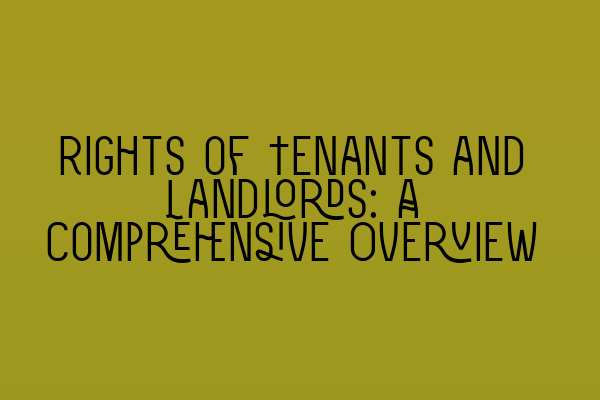Rights of Tenants and Landlords: A Comprehensive Overview
As a tenant or a landlord, understanding your rights and responsibilities is crucial to maintain a harmonious and legally compliant relationship. Whether you are just starting to rent a property or have been a landlord for years, it is essential to have a comprehensive understanding of the rights and obligations that come with the role. In this article, we will provide a detailed overview of the rights of tenants and landlords, covering various aspects of property law and land law.
Tenants’ Rights
Tenants are entitled to a range of rights under the law to ensure fair and safe living conditions. Some of the key rights that tenants have include:
- Right to quiet enjoyment: Every tenant has the right to enjoy their rented property without unnecessary disturbance or interference from the landlord. This means that landlords cannot enter the property without proper notice and consent, except in cases of emergency.
- Right to a habitable property: Landlords have an obligation to provide tenants with a property that meets certain standards of habitability. This includes ensuring that the property is in good repair, free from dangerous conditions, and has essential amenities such as heating and plumbing.
- Right to privacy: Tenants have the right to privacy within their rented property. Landlords should not intrude on a tenant’s privacy by regularly entering the premises without a valid reason or proper notice.
- Right to request repairs: If there are maintenance or repair issues in the rented property that affect habitability, tenants have the right to request repairs from the landlord. Landlords are typically responsible for addressing these issues in a timely manner.
- Right to protection from unfair eviction: Tenants are protected from unlawful or retaliatory evictions. Landlords must follow the legal eviction process and provide valid reasons for eviction, such as non-payment of rent or violation of lease terms.
- Right to a return of security deposit: At the end of a tenancy, tenants have the right to receive their security deposit back, minus any deductions for unpaid rent or damages beyond normal wear and tear. Landlords must provide an itemized list of deductions, if any, within a specified timeframe.
These are just a few examples of the rights tenants possess. It is crucial for tenants to familiarize themselves with their specific rights under their local jurisdiction to ensure they receive proper protection.
For more detailed information on the rights of tenants, you can refer to our article on SQE 1 Practice Exam Questions that covers relevant legal concepts related to tenant rights.
Landlords’ Rights
Landlords also have certain rights that enable them to effectively manage and protect their property. Some of the key rights that landlords have include:
- Right to collect rent: Landlords have the right to receive payment for rent from their tenants as agreed upon in the lease agreement. If tenants fail to pay rent, landlords have the right to take legal actions to recover the unpaid amount.
- Right to conduct property inspections: Landlords have the right to inspect their properties periodically, typically with proper notice to the tenants. These inspections are essential to ensure that tenants are complying with lease terms and maintaining the property appropriately.
- Right to deduct for damages: If tenants cause significant damage to a rental property beyond normal wear and tear, landlords have the right to deduct the cost of repairs from the security deposit. They must provide an itemized list of deductions within the stipulated timeframe.
- Right to eviction: Landlords have the right to evict tenants for valid reasons, such as non-payment of rent, violation of lease terms, or illegal activities on the property. Evictions must comply with the legal eviction process and any local regulations.
- Right to choose tenants: Landlords have the right to screen potential tenants and choose the most suitable applicants for their rental property. However, they must adhere to fair housing laws and cannot discriminate based on protected characteristics such as race, religion, or gender.
- Right to enforce lease terms: Landlords have the right to enforce the terms of the lease agreement, including rules and regulations pertaining to the property. This ensures that tenants are aware of their obligations and responsibilities.
These rights empower landlords to maintain the value and integrity of their properties. It is essential for landlords to be aware of their rights as they navigate their responsibilities.
For more detailed information on the rights of landlords, you can refer to our article on SQE 2 Preparation Courses that covers relevant legal concepts related to landlord rights.
Conclusion
Understanding the rights of tenants and landlords is crucial for maintaining a successful and legal tenancy. By familiarizing yourself with these rights, you can protect your interests and ensure a fair and productive relationship. Tenants and landlords both have specific rights that are designed to balance their responsibilities and create a mutually beneficial living arrangement.
If you have any questions regarding tenant rights or landlord rights, or if you require legal assistance in any property law matter, contact SQE Property Law & Land Law. Our team of expert solicitors can provide you with the guidance and support needed to navigate the complexities of property law.
For more information about property law or to explore our range of services, visit our website or check out our article on SRA SQE Exam Dates to stay up to date with the upcoming exam schedules.
